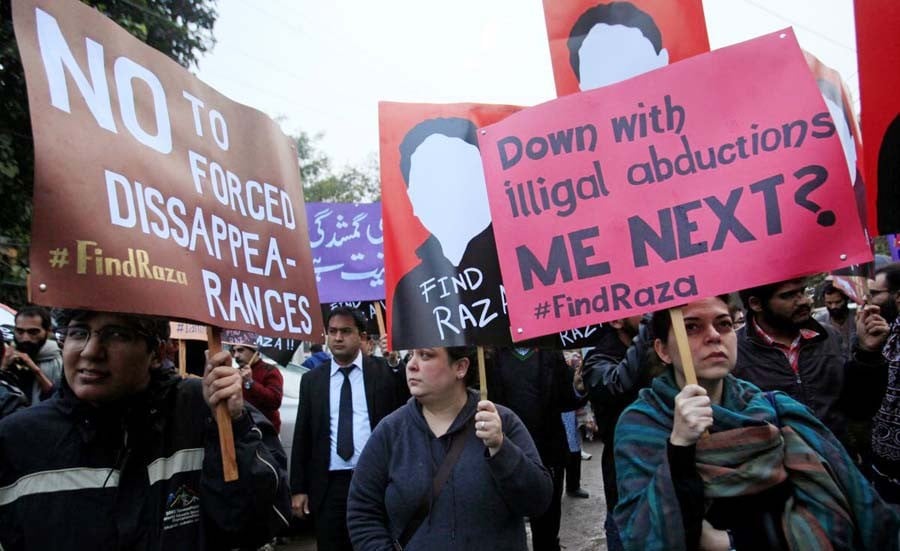
2017 saw substantial activism on missing persons for the simple reason that it was the activists themselves who went missing

It is heartening to see some of our politically inclined young musicians. Not always politically correct, they seek a better world nonetheless. Or let’s assume they do.
I happened to meet one such vocalist last week who prided on his "practical" rather than "idealistic or moralistic" political views. As the conversation moved to Raza Khan, the most recent missing activist, his elucidation was enlightening. The missing activists must learn to shut up after they return, he said, because when they don’t (like a few of them who refused to learn their lesson and kept speaking), they endanger the lives of those who are disappeared after them. Obviously, in his view, those who took away Raza Khan could not afford to be lenient with him after this display of insolence.
I earnestly hope the public response to this singer’s politics is just about the same as it is to his music. The fact remains the year 2017 saw substantial activism on missing persons for the simple reason that it was the activists themselves who went missing.
What Senator Farhatullah Babar said in a recent interview -- that you need "freedom to speak up" to "peep into the black hole" of enforced disappearances -- is a lesson learnt by the state long before he uttered these words. The disappearances that have come to the fore in this year, thus, are of people who have been agitating and campaigning for the cause of missing persons. But these disappearances are also preemptive; intending to prevent those who want to protest and express dissent, take away their courage and scare all the rest.
To me, the highlight of the year is, therefore, how a few of those missing persons, who were released a few weeks after countrywide protests, decided to talk; talk about who abducted them and why, details of the torture inflicted, in both prose and poems. But talk they did.
Yet, this was just one part. There were many others, like Wahid Baloch in 2016 and Punhal Sario and Zeenat Shehzadi this year, who chose to remain silent, invisible. And so many more who never get talked about the way they should, because they are not on society’s radars, and because the state has determined they are unpatriotic and work against ‘national interest’.
Read also: No bar on activist bench
It all began in the first week of January this year when five to six bloggers -- who ran their Facebook pages or had Twitter accounts that were critical of the military establishment -- went missing. The news about the first blogger led to information about others, and the subsequent storm on social media as well as in protests on ground led to an even worse development. The state used the most dreaded tool to put a bar against the storm: the bloggers were accused of blasphemy and the charges repeated ad nauseum by the state’s favourite media houses.
It was easier to protest for their political rights and freedoms but how could one defend the ‘blasphemers’. The air started reeking of fear. 2017 must also be then remembered as the year when blasphemy as a political tool was blatantly used by the state. The state must accept responsibility for creating a ground that became fertile for Mashal Khan’s murder and Rizvi’s sit-ins, though not for the first time ever.
One can safely claim that activism on the issue of enforced disappearances has been more pronounced in this year than before. Even though social media, which till now was considered a soft avenue for dissent, was on the receiving end of state control (the arrest of bloggers etc.), it also became the space where this censorship and control was thwarted with full force.
Others have put in their share too. Apart from social media and civil society, the mainstream media, parliament the Senate in particular, judiciary and the international human rights regime have all come together to lay down a blueprint of what needs to be addressed. Everyone agrees the Commission of Inquiry, a good starting point, is toothless and needs to be empowered and turned into a judicial commission; enforced disappearance needs to be criminalised; Pakistan must ratify the international convention on enforced disappearances; intelligence agencies must be brought under the scope of the law of the land; the anti-terror legal regime encourages enforced disappearances and such laws must change; the three member commission of judges’ recommendations of 2010 must be implemented.
This could all happen in 2018. But for this to happen, the government of the day must consider it a priority to bring the disappearances issue to a close. It needs will and support of all sections of society including the media. The activism of the bloggers and their courage will have to be emulated on a grand scale. That will come with noise and numbers; by going against our worthy musician friend’s counsel. For once, let the silence go missing!